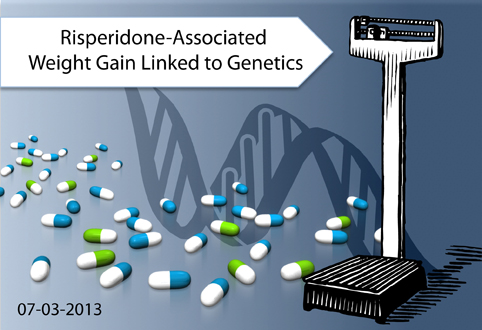Check out other stories from the Latest News
Risperidone-Associated Weight Gain Linked to Genetics
By Shana R. Spindler, Ph.D. and Chelsea E. Toledo, M.A. on July 3, 2013

Background: Risperidone is an atypical antipsychotic drug that acts by blocking the brain’s receptors for the chemicals serotonin and dopamine. While risperidone has been approved to treat schizophrenia and bipolar disorder since 1993, in 2006 the FDA deemed it an acceptable therapy for irritability in children and adolescents with autism spectrum disorders (ASD). Unfortunately, some patients experience antipsychotic-induced weight gain while using risperidone, but little is known about the variability of this symptom.
What’s New: A new study published 25 June 2013 in the journal Translational Psychiatry suggests that risperidone-induced weight gain is influenced by genetic factors. Researchers examined common genetic variations in “energy balancing” genes in 225 patients, aged 4-17 years. These patients belonged to the National Institute of Mental Health (NIMH) Research Units on Pediatric Psychopharmacology (RUPP) Autism Network trials of risperidone for the treatment of irritability in children and adolescents with ASD. Specific genetic variants affecting Cannabinoid Receptor-1 and Leptin, two proteins known to influence feeding behavior and weight, resulted in increased risk for weight gain with the use of risperidone.
Why it’s important: Adverse side effects from pharmaceutical treatments are of important concern. Understanding the genetic and environmental risk factors for side effects can help doctors develop more personalized treatments and improve clinical outcomes.
Help me understand :
| Source(s) : |
| Tweet |

